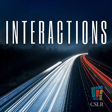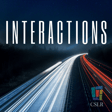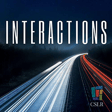Introduction to 'Interactions' Podcast
00:00:03
Speaker
Hello, I'm Ethan Anthony and welcome to Interactions, a podcast about law and religion and how they interact in the world around us.
Overview of 'At Home and Abroad' Book
00:00:14
Speaker
On March 22, 2021, Columbia University Press released the book At Home and Abroad, The Politics of American Religion. Edited by Elizabeth Shackman Hurd and Winifred Fowler Sullivan, this collection of 15 essays explores the ways religion connects with law and politics on topics ranging from religion in Hawaii to the culture of yoga.
Podcast's Exploration of Book's Chapters
00:00:38
Speaker
with reviews describing the book as a profound and inspiring volume that turns American religion inside out. At Home, The Broad is an engaging collection that is incredibly relevant today. And is this relevance that inspired us to dive deeper into the topics of this book?
00:00:55
Speaker
Over the next few months, we'll be exploring and discussing the importance of these chapters, the people who are most knowledgeable of the subject, the authors themselves. Our co-hosts, Ira Bedzo, the director of the Miriam Institute Project in International Ethics and Leadership, and Matthew Cavidon, the Robert Poole Fellow in Law and Religion, will be analyzing the work of our guest author and asking not only about the text and their inspiration behind the chapter, but also is titling us today.
Interview with Sarah Moth
00:01:23
Speaker
In our first episode, Matt and Ira speak with Sarah Moth, author and assistant professor of religious studies in the Bourns Jewish Studies Program at Indiana University. Her essay, Homemaking in Palestine, Jesse Sampler, Religion and Relation, explores poet and Zionist Jesse Sampler through the lenses of home and abroad. The three of them discuss the history of Sampler, the role of Zionism and Judaism on her identity, and the power of biographies for social change.
00:01:52
Speaker
all this and more on today's episode of interactions. Well, first off, Sarah, we want to thank you for coming on to the podcast. We really enjoyed your chapter and looking forward to talking about it in depth. But before we start, would you mind just telling our listeners a little bit about who you are and what you're doing?
00:02:18
Speaker
So I'm Sarah Imhoff. I teach at Indiana University Bloomington. I'm the Jay and Jeannie Schottenstein Chair in Jewish Studies. And my tenure home is religious studies. So most of my work as this chapter is a good example, speaks to both religious studies and Jewish studies audiences.
00:02:38
Speaker
Well, no, that's great. Let's get right into this. We've been chomping at the bit to talk to you about Jesse Semter.
Jesse Sampter's Religious Journey
00:02:45
Speaker
And I guess the first question we wanted to ask you, just to set some of the context and maybe some of the background, is if you could just tell us in particular why you chose Jesse Semter as a way to analyze concepts of home and abroad, as well as some of the intersecting lenses that you bring up in terms of the individual and the community when thinking about religion.
00:03:07
Speaker
Yeah, so I think Jesse Sampter is both really distinctive and indicative of broader trends and
00:03:20
Speaker
ideas in religion, both in the US and in Palestine as she moves there. More, I think, the US of her time. So just to give you a little taste of what this looks like, she was born into an ethical culture family, then came to Zionism. Through Zionism, she came to Judaism.
00:03:40
Speaker
But throughout her life, she was really fascinated by religious ideas in general. She read Christian works. She also read the Vedas. She loved Emerson. Later in her life, she translated some of the works of Jiddu Krishnamurti into Hebrew.
Sampter's Spirituality and Social Movement
00:03:58
Speaker
So she was almost omnivorous when it came to religious ideas. And so I really liked the idea
00:04:07
Speaker
of having a smart and reflective person to show us that most people's religious ideas are drawn from not just inside one tradition, not just one place,
00:04:23
Speaker
not just inside the boundaries of some box called Judaism or Episcopalianism or Hinduism. I mean, not that Hinduism is even a compelling box by itself. It's like many boxes, right?
00:04:39
Speaker
Yeah, no, we will talk definitely about about her influences and then how her influences there then influenced others through her writings. But just even a quick question, we noticed that you also wrote a book on Jesse Semter. Did this chapter come out of some of the research from that book or like how does your your biography and analysis of Jesse Semter on its own accord speak to the ways you were started to think about home and abroad or generally?
00:05:07
Speaker
Yeah, so I hadn't been thinking in terms of home and abroad when I was writing the biography, but being part of this research group that was thinking about the categories of home and abroad really compelled me to use her to think about them, in part because I thought that you could get a hold of some things
00:05:29
Speaker
through her reflections, through her writings, that you couldn't necessarily get a hold of by looking at organizations or political developments. So for example, I think affect is a really important piece of what makes something feel like home for a person or for a community. And that was something I could get at through Samper that was harder for me to look at through bigger questions.
Zionism's Inclusivity and Identity
00:05:58
Speaker
that she presented a great example of how those categories are a bit messy. You might say, well, the US was her home because she was born there and her sister and her sister's family were still there. And she moved to Palestine and that was her adopted home or something like that. But she, in her own words,
00:06:19
Speaker
says that she's still searching for a feeling of at-homeness when she's living in the US. And she's hoping to find that at-homeness in Palestine. So then which one is at home and which one is abroad? And she has complicated feelings about both places in terms of how she fits in, how the Jewish people might fit in, and therefore, what might count as home. So I really liked that.
00:06:46
Speaker
You could see the complications of saying one thing is home and other things are abroad by looking at her own reflections. And I think that those other complications are reflected in many of the other articles in the At Home and Abroad series. But it was neat for me to be able to look through her to see some of that complexity. Speaking of complicating categories,
00:07:11
Speaker
We often think about spirituality as an intentionally individual sort of a practice. And indeed, a lot of the book talks about how an individualized privatized spirituality is the American default. It seems like a lot of Ms. Sampter's background and the ethical culture movement and things like that are very much focused on individual spirituality. We usually
00:07:36
Speaker
see religion as being on the opposite end of the poll, a very collective, public, power structures sort of phenomenon. I want to hear your thoughts about how Ms. Sampter carries both of those forward and participates in a national and cultural and social movement that has religious undertones to it in many ways, and yet how she's also carrying forward a privatized spirituality throughout the course of that. I just want to hear more of your thoughts about that complication from her life as well.
Intersection of Religion and Public Rituals
00:08:06
Speaker
Yeah, that's a great point. When she becomes a Zionist, Zionism is not necessarily directed at forming a Jewish state. The thing that Zionists have in common is they think of Jews as a people, or in the terms of the time, a nation, but they don't mean a nation state. They mean a nation as in a people.
00:08:30
Speaker
One of the interesting things about that is that each one of these people can nevertheless have their own ideas. We might even say their own religious ideas. So she's happy to be part of a Zionism that includes atheists and Orthodox Jews and people like her who are religious but don't quite fit into one of the denominations of Judaism in the US, for example.
00:09:01
Speaker
So I do think that there's something that works well for allowing space for people to have a diverse set of ideas within the Zionist framework that she's participating in, and that it is very much about the collective, but what makes the collective is not a shared set of ideas. So people can have a different set of ideas, I mean, apart from the idea of Jewish peoplehood.
Methodological Insights from Sampter's Life
00:09:29
Speaker
Which is Mordecai Kaplan her friend's term so it's not super popular at the time But I think it's useful to describe what she thinks she's up to and many Zionists do too. So yeah, there's this shared sense of Jews as a people and that's a very kind of corporate I don't mean corporation. I mean like embodied kind of corporate sense of
00:09:57
Speaker
sense of who they are together, but then also the idea that there's plenty of space for people to have individual thoughts and even, I mean, in your word, spirituality, even kind of pursue individual sorts of spirituality without departing from a Zionist group.
00:10:19
Speaker
Talal Asad said that we need to rethink civic religion and stop focusing so much on beliefs and focus more on rituals and institutions, things like that. As a follow-up, how does that tension that you're talking about affect how we think about civil religion?
00:10:39
Speaker
That's a fascinating question. I think that if we were asking questions about civil religion in the US at the time, we would ask very different questions and we would be asking about Palestine at the time. In that Palestine
00:10:58
Speaker
was not a state. It was part of the British mandate when Samptar went there. And so public religion is contested and frankly kind of weird because the British default is Christian. The people who live in Palestine are Muslim or Jewish, but there are some Christians and the Arab Christians in Palestine are not recognized carefully by the British. So
00:11:27
Speaker
I think if we're asking about, say, public institutions, Palestine is, even if it would be tempting to default to like, oh, we can describe civil religion, we would end up with a very dense map of things that were being done in public. And here I am thinking rituals and things like that. So I think my answer to this question is,
00:11:56
Speaker
Yes, it's very important to attend to these things and what it looks like to attend to them will be different in the US than in Palestine because of their relationships to things like empire and being or not being a nation state.
00:12:09
Speaker
I want to go back to the way you described Zionism at the time of Jesse Sampter's life. I think it was really interesting in how you were able to balance the tension between collective and individual. And it also spoke to me, at least methodologically, in terms of how you look at different lenses of analysis, like looking at the lens of the individual's life versus the community's life and so forth. And one of the things that you say in the chapter, which
00:12:37
Speaker
You try to say, we have to be very careful in terms of looking at an individual as a microcosm to the collective, or thinking that if you look at a collective that speaks to a homogenous group, which speaks to your description of Zionism.
Disability, Community, and Belonging
00:12:52
Speaker
But it also creates a bit of a challenge in terms of how the example of Jesse Semter speaks to anyone but Jesse Semter.
00:12:59
Speaker
So how does the example of Jesse Sampler speak to these bigger questions that you're looking at in terms of home and abroad, or even religious identity or Zionism at that time? Yeah. When I introduced her, I said in the beginning that she's quite distinctive. Most US Jews
00:13:21
Speaker
at her time, so the early 20th century, were not Zionists. I think the last number that I saw was there were 3,800 Jews who paid their shekel, which was a contribution to the Zionist organization in the year 1900. That's really tiny. It's more than that, but it's not six figures by 1920. So in that way, she's distinctive. In another way, she's even more distinctive in that she's not an immigrant.
00:13:51
Speaker
an acculturated Jew, she grows up speaking English, and she's more well-to-do than most of the people who were the major players in US Zionism. But I do think that her life is indicative of a larger
00:14:15
Speaker
set of norms. And sometimes it's that we can see those norms because she's the one pushing against them. So I talk about this in the book. It doesn't really come up here very much, but she had polio as a child. And she pushes against norms of Zionism, both US-based Zionism and Zionism in Palestine, by
00:14:39
Speaker
demonstrating that a person who is not able-bodied, a person who cannot work in the field, can and should be a part of the building, the upbuilding of Jewish life in Palestine. And so in that way, we actually, she functions as a refraction of the shared ideas by saying, oh, that shared idea is not what I want to see in the world. I think another thing
00:15:06
Speaker
that she teaches us more broadly. And here, I think it's rather than saying she shows us by means of difference, she shows us by means of similarity is the idea that wholeness and a broadness does have to do with affect with feelings. It's tempting to imagine that
00:15:26
Speaker
when there is a wave of immigration. We talk about factors like economics. We talk about factors like networks. Do you have family there, et cetera? But we should also talk about affect. This matters.
00:15:42
Speaker
It matters how you feel when you live someplace. Does it feel like home? And of course, a whole bunch of things go into does it feel like home? Some of those are economics and family, right? Do you have enough money to make yourself feel comfortable? Do you have connections that make you feel at home there? But I do think that she's quite reflective about those
00:16:04
Speaker
affective responses that she has both to living in the US and to living in Palestine that can cue us in to ask those questions about other folks who are maybe less explicitly reflective about it.
Contemporary Issues of Identity and Belonging
00:16:18
Speaker
Do you think that her effects, her influences, I mean, what influenced her, her background speaks to contemporary American Zionists or American Jews that moved to Israel today, or even people who move from one country to another and find a new home? Like how big is her lesson for today's readers?
00:16:42
Speaker
I would say that methodologically, it's a big lesson. And methodologically, the lesson is we should ask about affect in each of these individual cases. I think that her particular affect is slightly more
00:16:56
Speaker
unique term, not slightly more unique, that's silly, but is more specific to her. Not least because when many American Jews move to Israel now, they think of Israel as a kind of second home state. They think of it as a place that already has a close relationship with the United States. When Samptar moved to Palestine, most American Jews thought that it
00:17:23
Speaker
maybe could be a safe haven for Jews from elsewhere, but they were not interested in going. So I think that she was very excited about it, but there was a little bit of consternation. So I think her affective responses to moving to Palestine would be quite different than someone today who is Jewish moving from the US to the state of Israel. But I do think that she can clue us in into what kinds of questions we should ask.
Interplay of Religious and Political Ideas
00:17:53
Speaker
When I read your chapter and I got to the part where Ms. Sampter observed that both Arabs and observant Jews needed to drop their sense of romantic nationalism and just learn to get along in a new nation, I attributed that to a more liberal secularist spirituality that she had grown up with. But what you're saying about polio and about alternative ways of
00:18:20
Speaker
framing who belongs in the new nation and in the new state. And when I hear what you're saying about affect being important to her, do you think it's just that she had a different affect than did a lot of the nationalists? Or is it that there is some reflection of the intellectual context that she came from? Or is it both? Because she's an unconventional Zionist in a lot of ways.
00:18:47
Speaker
And I want to hear more about that in light of where our conversations go on this afternoon. Yeah, I think there's certainly an intellectual component to that. That sense that Jews and Arabs are brothers is a word that she uses.
00:19:06
Speaker
That's informed by her sense of history. It's informed by her sense of ethics It's I think also informed by her having grown up in the US where She imagined that people of different religions did live side by side peacefully and productively. I Also think that
00:19:34
Speaker
And this is speculation, right? I can trace her intellectual ideas because she wrote so many of them down. But just speculating, I would say, I think because in many ways she was an outsider to the Zionist movement, she may have been more attuned to other people who didn't fit. So for example, she was a champion of educating
00:19:59
Speaker
children from Yemen who were Jews and she wanted to see them included as part of the Zionist movement, they weren't really included by Ashkenazi Jews who would just kind of shun them from kindergartens and things like that. I don't think that it would be too simple to say, oh, that's because she has polio when she was a kid and therefore she's attuned to all other outsiders, right? That's entirely too simple. But I do think that she was
00:20:24
Speaker
more attentive to what boundaries might be drawn, in part because she's very aware that Zionism is up for grabs or it's multiple. There are lots of different voices. It's not at all clear there's even going to be a state. And as you can tell from the chapter, she
00:20:46
Speaker
If there's going to be a state, she wants it to be a bi-national state. She says it shouldn't be a Jewish state. That would be kind of racial and backwards. But she's really committed to a Jewish society that works alongside and with others around it. So I think it's a complicated question to pinpoint exactly where
00:21:09
Speaker
the impetus came from for her to be more inclusive of Arabs than many of her Zionist peers, which is not to say fully inclusive. But I do think that we would want to look both to her intellectual past and her own personal experiences.
Sampter as a Jewish Thinker
00:21:31
Speaker
What was the relationship between Semter's religious ideas or religious thinking and her political ideas or political thinking? And I ask that also in relation to her friendship with Mordecai Kaplan, like if she saw Judaism as a civilization, at what point does her religion and politics become merged? Yes. Hard to know. I mean, she doesn't say things like, this is my religion and this is my politics. And I think for her,
00:22:01
Speaker
they're intertwined maybe even from before she becomes a Zionist. Her religious ideas are always ideas that relate to the world. So before she becomes a Zionist, she writes a couple of books. Some of them are about the, so they're kind of poetic. One of them is in many ways about the individual as
00:22:28
Speaker
integrated with the natural world and God also being integrated with the individual and the natural world. And that has political implications for her from the start about who should be included and how you treat other people and what kind of experiences the human might want to have in the world. And then after she's a Zionist, she interestingly comes to Judaism through Zionism and not the other way around. But after she becomes a Zionist,
00:22:58
Speaker
It's clear that Judaism is one of her ways of plugging into a feeling of connection with Jewish people.
00:23:13
Speaker
I think they're hard to separate right from the beginning, her sense of religion and politics. There are certainly political moves that she makes that we can say it's not explicitly religious. For example, she's a pacifist. She says the United States is making a mistake in entering into the First World War. And she does not explicitly tie that to religiosity.
00:23:41
Speaker
I think we could see it fit in with some of her more religious thought, too. So I guess there are moments when we can say that political move seems more politically linked or that one seems less. But I would be hard pressed to say there were times that we could separate them fully at all. Because her influences are so diverse. I mean, you might even think that she's syncretic in how she puts her philosophy out or her thinking out
00:24:08
Speaker
Would you define her or describe her as a as a Jewish thinker and however you answer that question, please define the term Yes, so I would say yes. She's a Jewish thinker many of her sources are Jewish when she's
00:24:25
Speaker
presenting her philosophical thought. Here's the biggest reason. She thinks that a sense of belonging is really important for all people. She says, I'm a nationalist, by which she means I'm a Zionist. This is my brand of nationalism. And I'm an internationalist, by which she means that
00:24:47
Speaker
The best version of the world is where each person belongs to a group, a nation in her terms, and each one of those brings its own values together, and then the world is stronger.
00:25:01
Speaker
So she identifies herself as Jewish. It's also sensible to identify her as a Jewish thinker because many of the people with whom she's in conversation are Jewish. Many of them, I don't know, I think Henrietta Soule also counts as a Jewish thinker, even though she usually gets described as more of a doer, but she herself
00:25:25
Speaker
has some pretty important things to say. She stops writing other than things like letters and Hadassah related things in her later years.
Non-Traditional Family and Societal Norms
00:25:32
Speaker
But in her earlier years, she is too. Sampler obviously has a relationship with Mordecai Kaplan that continues throughout to the end of her life. So yes, she's a Jewish thinker. The canon of Jewish thought is, if you ask me, kind of still embarrassingly closed and small. And I,
00:25:55
Speaker
think we learn a lot from adding people to it. So I just told you we should add both Jesse Sampter and Henrietta Soule to our list of Jewish thinkers. So some of that is dispositional. I'm changing my syllabi. Thank you for the suggestions. I want to hear more about doing as a form of thinking. You mentioned Ms. Sampter's gardens. You include a diagram of her house in the chapter. You talk about her
00:26:21
Speaker
residents with her earlier thoughts about communing with nature as she's actually planting fruits and growing the land in a very literal sense. So understanding that perhaps Ms. Soul is a better example of a doer from whom thinking can be derived. Tell me about what Ms. Sampter's doing and how that fits into your broader picture here of what her project was all about. Yes, I think
00:26:49
Speaker
that she's in fact a great example because on the face of it, she seems like she can't do the typical kind of doing that goes along with being a Zionist. So that typical kind of doing is pretty literally up building the land, building structures, working in agriculture, et cetera, building infrastructure too. And those things are not available to her because of the body that she has.
00:27:17
Speaker
She does, however, do this gardening and what I describe as homemaking, right? She's making a home for her and also kind of an open home later in her life. She and Leah Berlin join a kibbutz together and part of her terms, because she's bringing a fair amount of money with her, include that there's going to be a vegetarian rest home.
Queer Identity and Gender Roles
00:27:40
Speaker
So there she's making a home for workers who are ill or injured or need a rest in some way.
00:27:47
Speaker
So I think that her doing is, I mean, in a sense, a form of thinking, right? It's making claims about what it means to create a new society or a good society. It's making claims about how to best relate to the land. It's interesting to me that she
00:28:12
Speaker
is never thinks of a kind of dominate the land, right? That's kind of a
00:28:18
Speaker
I would say a masculine paradigm, but we can see lots of that dominate the land as a way of owning it, right? Think about manifest destiny, think about imperialism. She's not in the business of doing that relationship with the land. When she does relationship with the land, she does cultivate it. She does grow things in it. She does learn about it so she can figure out what grows well in it. So I see those things
00:28:47
Speaker
as making claims about what a good or appropriate relationship with the land would be. And that's a central thing in Zionist thought, is what's the relationship with the land. Speaking of relationships and growth, we don't see anywhere in the chapter, and maybe it is in the biography,
00:29:09
Speaker
Anything about family relationships, romantic relationships. Here is a move again about populating a new place. And we have a woman who doesn't have kids. We have a woman whose main companion is another woman until the kibbutz years.
00:29:27
Speaker
Tell me about that, about that side of affect, relationship, nation building, what it means in the context of her interpersonal relationships and how she chose to prioritize her time and commit her life.
Influence on Zionist Thought
00:29:44
Speaker
There is a fair amount of this in the biography where I call her queer. And that is not a claim about what kind of sex she had with whom. I don't know if she and Leah Berlin ever had sex. And frankly, I think that's like the least interesting question. What's really interesting to me is they did make a life together. She also doesn't make much of an appearance here, but Sampler adopted an orphan from Yemen.
00:30:10
Speaker
named Tamar, and she raised Tamar, and Leah Berlin helped raise Tamar also. So here, Sampter's doing something that is very unlike the gender norms and the reproductive norms of Zionism, which is pretty heterosexual and invested in the reproduction of the Jewish people for the future.
00:30:38
Speaker
So she sort of does those things, but in a very different way, right? She creates a family network or a kinship network that is not about blood, although she does have a good relationship with her sister who continues to live in the US. Part of the reason I know so much about her personal life is because she wrote her sister a long letter basically every week that she lived in Palestine.
00:31:04
Speaker
So that's quite a few letters, and they're pretty long. So I think she's doing her Zionism quite differently. She has interpersonal relationships. She loves living on the kibbutz, but in a way, she's
00:31:25
Speaker
not fully of the kibbutz because she can't do the manual labor that they can. And when she and Leah go to live on the kibbutz, they're older than almost everyone else by some years. So they're part of it, but not 100% part of it, not fully integrated into everyday life at the kibbutz, even though she is
00:31:50
Speaker
fully invested in the ideology and shapes the ideology there on the kibbutz too.
Sarah Moth's Interest in Sampter
00:31:59
Speaker
I got to ask, how did you find Jessie Santer? Where did your interest in her to not only write this chapter, but write a biography, continually use examples from her life for some of your other writings and teachings? How did this relationship begin?
00:32:16
Speaker
My first book was about men. It was about masculinity and American Judaism. And there is a chapter on Zionism. And so I had oodles of examples of what American men were saying about Zionism, especially with respect to masculinity. And I just didn't have very many examples of what American women were saying about Zionism. And I had seen Samper's name come up a couple of times, but
00:32:41
Speaker
I figured I would see what there was in the archives because I could see there were some of her papers in the central Zionist archives in Jerusalem and I was going to look at some other stuff.
00:32:53
Speaker
I pulled some papers for her and was captivated. She is super interesting. They had a bunch of stuff. It turns out they even had more stuff than they had listed in the catalog. And in the beginning, I was like, wow, she's so interesting. I'm going to write an article about her. She's not really right for this masculinity book. She didn't have that much to say about little bits here and there, but nothing super quotable or
00:33:22
Speaker
really amazing for the first book. But I was, yeah, I was hooked. She was so fascinating. I mean, and for me, one of the most important hooks was, what does it mean for this person who was disabled and lived a queer life to embrace Zionism? That seems like her political ideals and her embodied life just didn't match up. And yet it wasn't that she was unreflective
Historiography and Individual Narratives
00:33:49
Speaker
about this. She was quite reflective about it. So that's the hook.
00:33:53
Speaker
No, I get it. Believe me. Even just hearing not only how you speak about it, but the chapter and some of the other stuff I read about what you wrote on her. I understand why she would be someone that you would continually learn lessons from. Are we just doing history wrong? I mean, a lot of our questions assume that if you want history, you find neat microcosms of broader social movements and you tell them as a way of telling a broader story.
00:34:22
Speaker
Here we've got somebody who, in relief, tells a very interesting story or an alternative story. What should we be doing when we're thinking about historiography in light of your research? And have you seen other examples of folks doing what you did with Ms. Saptor, which is turning things on their head, using personal stories,
00:34:48
Speaker
not to tell bigger stories, but just to say that look, individual stories are a really important part of history as well. I don't want to put words in your mouth, but I'm curious for your reflections on the study of history as a result of this project. That's a great question. I'm going to be thinking about that for a while. I don't think we're doing history wrong, but I would say
00:35:12
Speaker
that this is an additional way we should be doing more of. I was talking to Susanna Heschel when I was writing this, and she said to me, one thing I love about it is you not only ask what her life meant to us, but you ask what her life meant to her.
00:35:28
Speaker
And I think this grew out of Heschel's sense that many people had written about her father, Abraham Joshua Heschel, and not asked what his life meant to him, but rather just in a kind of instrumental way, what his life meant to others. And I took that really seriously. And I think we need both those questions when we're doing history, which is not to say that every project must do both those questions, but that
00:35:58
Speaker
they are both really meaningful if we want something out of history that's other than a list of past facts, right? Even if all we want is a meaningful narrative that's a story we can tell ourselves about the past, I think we still want both those questions.
Conclusion and Podcast Distribution
00:36:15
Speaker
Well, Sarah, I can't speak for Matt. I really appreciated this conversation. Matt, you can say how much you appreciate it yourself. I think that you gave us a lot more in this conversation than we could have gotten just reading the chapter alone. And I know that I'm now going to go back and look again at the biography and some of the other writings of Jesse Sampler to see what
00:36:39
Speaker
Not only I can learn from her, but what she was able to take from her own experiences and articulate that experience through heretics. One of the things I really appreciated was, especially in the study of law, of the history of social studies, we do tend to focus on bigger phenomena and not focus on the way that those bigger phenomena get translated into the lives of individuals.
00:37:05
Speaker
rather than just that individuals are building blocks for some bigger thing. And I think that this is a very important counterbalance to that. And so I really appreciated you taking the approach that you did and putting it into the places that you did, where this is not just in a couple of biographical studies, but that it is sitting in the middle of a volume about at home and abroad. I appreciate that you are taking
00:37:30
Speaker
those individual embodiments and particularities and upfronting them in the middle of those kinds of settings and conversations. So thank you. Thank you so much for having me. You've asked such great questions and you know, you'd think after I'd written a whole book and some other things about Sampler that I would have thought everything there was to think, but surely not. I'm going to take some of your questions home with me. So thanks so much for having me.
00:37:58
Speaker
Thank you Sarah and Ma for joining us in this discussion, and thank you all for listening. If you'd like to stay updated on new and upcoming episodes, please be sure to like, share, and subscribe. The Interactions podcast is distributed by the Center for the Study of Law and Religion at Emory University and Canopy Forum, and produced by Ethan Anthony.







